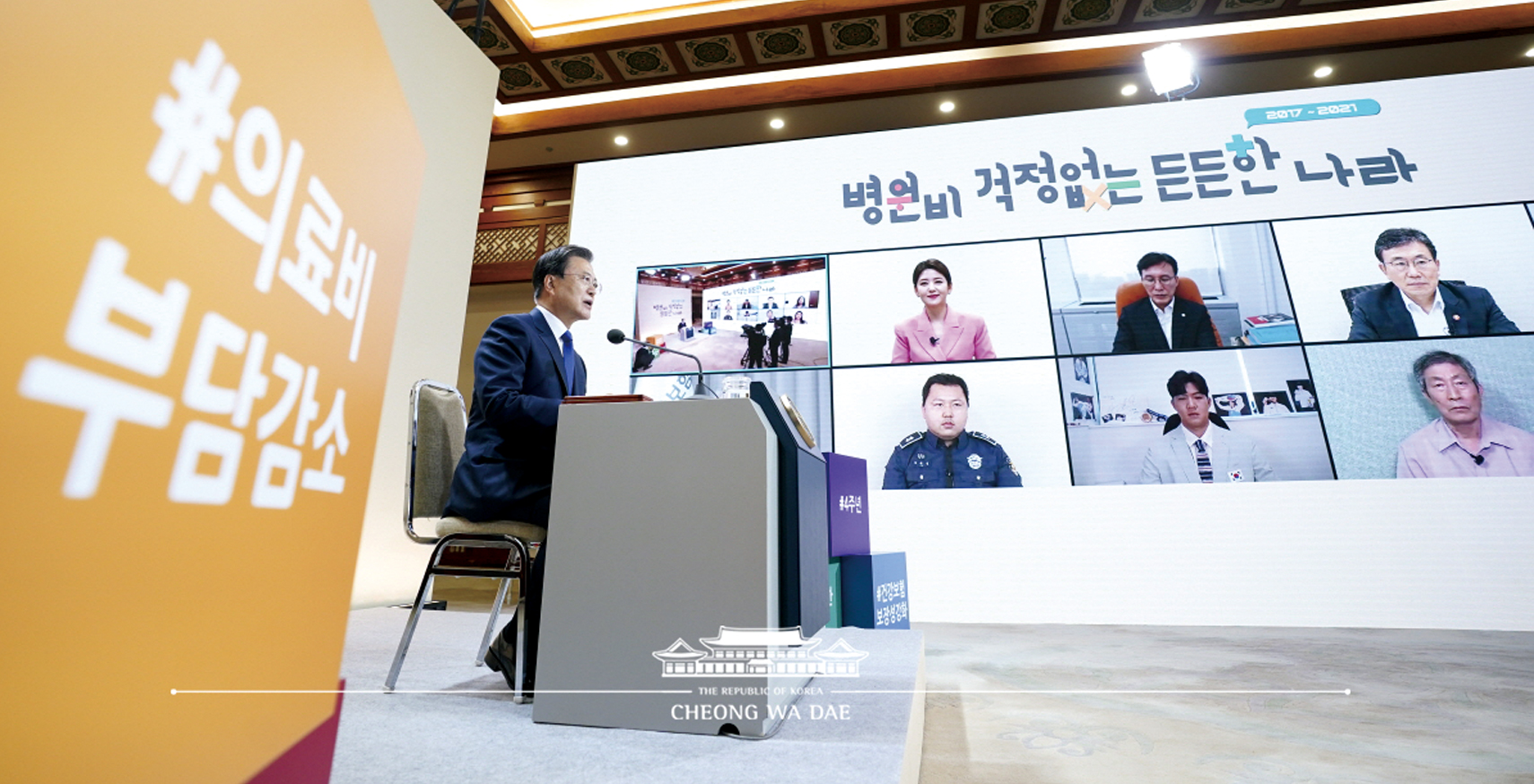October 2021

October 2021
The Korean government’s policy to expand national health insurance, also known as “Moon Jae-in Care,” marks its fourth year. The inclusive policy has helped ease people’s financial burdens from expensive medical treatments, especially for the underprivileged and during the COVID-19 crisis.
Written by
Sohn Ji-ae
Photo courtesy of
Cheong Wa Dae
 President Moon Jae-in on Aug. 12 speaks at an online conference commemorating the fourth year since the introduction of Moon Jae-in Care. © Cheong Wa Dae
President Moon Jae-in on Aug. 12 speaks at an online conference commemorating the fourth year since the introduction of Moon Jae-in Care. © Cheong Wa Dae
Korea’s healthcare system is rated as one of the best among developed economies in the world. The nation provides its citizens with affordable and extensive health insurance coverage for essential medical treatments that could be expensive in other countries.
Under the current administration, the recognition has been further consolidated, thanks to its “Moon Jae-in Care.”
Marking its fourth year, the policy of expanding state-run health insurance coverage has been a success, with the rate of coverage at top hospitals treating many serious disease patients, and especially for the underprivileged, approaching 70 percent.
Moon Jae-in Care has protected patients and their families from financial burdens in the event of any medical emergency that may require expensive procedures. For instance, lung cancer patients now pay only 5 percent of expensive anticancer medicine fees, which could otherwise cost them more than KRW 3 million (USD 2,500), since the national health insurance covers 95% of the fees. A mother, who had to pay around KRW 300,000 (USD 250) every time her kid with cleft lip and palate received orthodontic treatment over 10 years, now doesn’t have to worry about the expenses, since the treatment fees are covered by Moon Jae-in Care.
When the government unveiled Moon Jae-in Care four years ago, the primary goal of the policy was to make national health insurance “inclusive.” It has ensured that a lack of money never prevents anyone from receiving treatment and that no households are ruined because of medical expenses.
According to the government data, 37million people have saved a total of KRW 9.2 trillion (USD 7.8 billion) in medical expenses, as of the end of 2020. More importantly, the country’s inclusive health insurance system has expanded coverage for those who are more likely to frequent hospitals, such as children under five, the elderly aged 65 and over, and people with disabilities. For instance, medical fees for treating severe dementia, as well as the cost of dentures and implants for the elderly, have been cut down significantly.
In addition, the government has expanded the scope of health insurance coverage, focusing particularly on cancer and other serious diseases that require expensive medical treatments. Non-benefit categories necessary for medical care, such as magnetic resonance imaging (MRI) and ultrasound examinations, have been covered by Moon Jae-in Care, as well.
President Moon Jae-in also pointed out that the health insurance system has played a key role in the nation’s success in keeping COVID-19 under control. The policy has helped the nation respond quickly by paying for COVID-19 testing and treatment for those infected who were then swiftly diagnosed and treated with no worries about medical expenses.
“The national health insurance has provided a reliable last line of defense in the prevention and control of COVID-19,” President Moon said.
Despite the achievements made thus far with the implementation of Moon Jae-in Care, there are still many treatments that have not been covered by the national insurance program. Because of high costs, many families still can’t afford to receive medical treatment that they need or are unable to make ends meet after paying for the bills.
Through Moon Jae-in Care, the government pledges to continue to build a country where people can receive treatments without having to worry about expenses.
By the fourth quarter of 2021, the government will reduce medical expenses for ultrasound scans for thyroid and paranasal, which remain expensive despite high demand. Costly medical treatments for diseases like severe cardiac ailments, psoriasis, and root canals, will also get more affordable by the end of next year.
In addition, the government will increase support for public medical centers that specialize in pediatric care and establish short-term hospitalization service centers for severely ill children next year. More of the currently non-reimbursable emergency rooms, intensive care, and prescription drug costs will soon be covered by the national health insurance, as well.
“Strengthening health insurance coverage constitutes the foundation of the people’s health and will serve as a steppingstone for achieving an inclusive recovery and leap forward,” President Moon said. “The government will continue to do its upmost to build a secure nation that is free of anxiety caused by medical bills.”